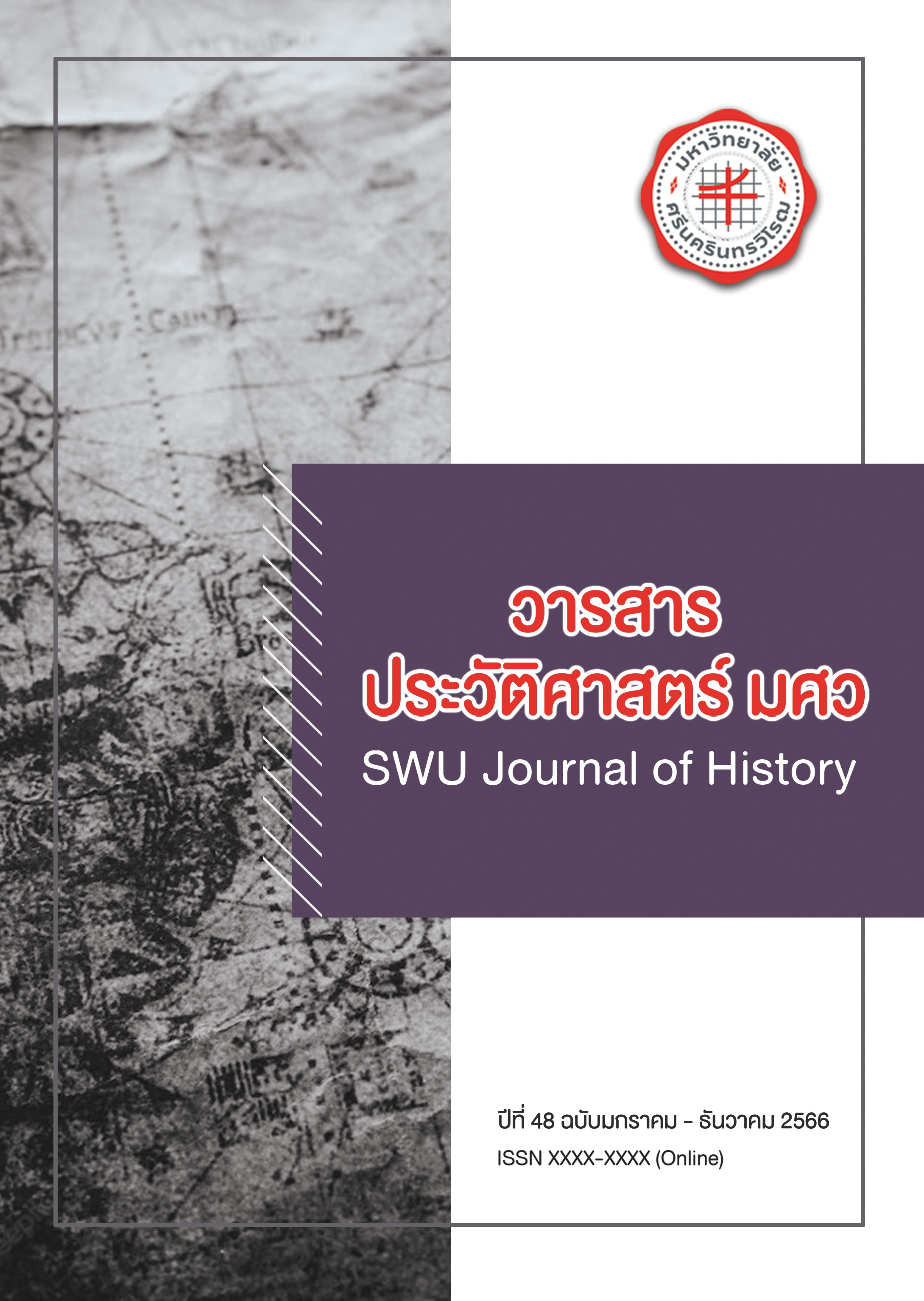“The Grandest Society of Merchants in the Universe”: The Rise and Fall of the English East India Company
Main Article Content
Abstract
For more than two centuries of its history, the English East India Company (EIC), founded in 1600 to conduct the spice trade in the East, had transformed itself into an undisputed overlord of the Indian Subcontinent, one of the richest lands on earth, making the company “the grandest society of merchants in the Universe”. Being allowed to control its own army and wage war with indigenous states and peoples independently from the British Government’s intervention, the company used these privileges to establish and expand its position in the subcontinent continuously. Its victory in the Battle of Plassey of 1757 saw the beginning of the “Company’s Rule” in which the company gradually replaced Indian rulers. However, since the EIC was, by then, no longer a conventional trading corporation, ruling over the Indian Subcontinent with unlimited powers, the British Government began its lengthy intervention to take more responsibilities in the governance of India. This article explores the history of the EIC from its early days as an overseas trading company to its heyday when the company ruled over the whole subcontinent as well as its downfall in 1858 when the British Government took over control of India. Although the EIC’s history was a story of wars and aggression which the company imposed upon native rulers and populations of the subcontinent, its existence in India for more than two centuries had unarguably paved the way for Britain to become an effective ruler of India, the “Crown Jewel” of the British Empire.
Article Details

This work is licensed under a Creative Commons Attribution-NonCommercial-NoDerivatives 4.0 International License.
References
Andaya, Barbara Watson; & Andaya, Leonard Y. (2015). A History of Early Modern Southeast Asia, 1400-1830. Cambridge: Cambridge University Press.
Banerjee-Dube, Ishita. (2015). A History of Modern India. New Delhi: Cambridge University Press.
Boxer, C. R. (1965). The Dutch Seaborne Empire, 1600-1800. London: Penguin.
Chandra, Satish. (2004). Medieval India from Sultanat to the Mughals: Part One, Delhi Sultanat (1206-1626). Third Edition. New Delhi: Har-Anand.
Clulow, Adam; & Mostert, Tristan. (2018). The Dutch and English East India Companies: Diplomacy, Trade and Violence in Early Modern Asia. Amsterdam: Amsterdam University Press.
Dalrymple, William. (2019). The Anarchy: The Relentless Rise of the East India Company. London: Bloomsbury.
Daniell, Christopher. (2006). A Traveller's History of England. Fifth Edition. Massachusetts: Interlink Books.
Dijk, Wil O. (2006). Seventeenth-century Burma and the Dutch East India Company, 1634- 1680. Singapore: Singapore University Press.
Merriman, John. (2004). A History of Modern Europe: From the Renaissance to the Present. New York: W. W. Norton & Company.
Peers, Douglas M. (2013). India Under Colonial Rule: 1700-1885. New York: Routledge, 2013.
Phillips, Andrew; & Sharman, J. C. (2022). Outsourcing Empire: How Company-States Made the Modern World. New Jersey: Princeton University Press.
Richards, John F. (1993). The Mughal Empire. Cambridge: Cambridge University Press.
Robins, Nick. (2012). The Corporation That Changed the World: How the East India Company Shaped the Modern Multinational. London: Pluto.
Sykes, Adrian. (2011). Made in Britain: The Men and Women Who Shaped the Modern World. London: Adelphi.
Williams, Hugh. (2008). Fifty Things You Need to Know About British History. London: Collins.
Wilson, Jon. (2017). India Conquered: Britain’s Raj and the Chaos of Empire. London: Simon & Schuster.
Brunton, Bruce. (2013). The East India Company: Agent of Empire in the Early Modern Capitalist Era. Social Education. 77(2): 78-81, 98.
Harris, Robert D. (1976, June). French Finances and the American War, 1777-1783. The Journal of Modern History. 48 (2): 233-258.
AMDigital. (2017). The captain-general of iniquity: The impeachment of Warren Hastings. Retrieved January 15, 2023. https://www.amdigital.co.uk/insights/blog/the-impeachment-of-warren-hastings
ART UK. (n.d.). Shah 'Alam, Mughal Emperor (1759-1806), Conveying the Grant of the Diwani to Lord Clive, August 1765. Retrieved March 15, 2023. https://artuk.org/discover/artworks/shah-alam-mughal-emperor-17591806-conveying-the-grant-of-the-diwani-to-lord-clive-august-1765-191206
Ota, Atsushi. (2013). The Dutch East India Company and the Rise of Intra-Asian Commerce. Retrieved January 15, 2023. https://www.nippon.com/en/features/c00105/
Bekhrad, Joobin. (2020). The floral fabric that was banned. Retrieved March 15, 2023. https://www.bbc.com/culture/article/20200420-the-cutesy-fabric-that-was-banned
Bogart, Dan. (2015). The East Indian Monopoly and the Transition from Limited Access in England, 1600-1813. Retrieved January 15, 2023. https://www.nber.org/system/files/chapters/c13506/revisions/c13506.rev0.pdf
Britannica. (2022). East India Company. Retrieved December 2, 2022. https://www.britannica.com/topic/East-India-Company
Britannica. (2023). Joseph-François Dupleix. Retrieved January 10, 2023. https://www.britannica.com/biography/Joseph-Francois-Dupleix
National Archives. (n.d.). Currency converter: 1270-2017. Retrieved January 10, 2023. https://www.nationalarchives.gov.uk/currency-converter/
Ramesh, Randeep. (2007). India's secret history: ‘A holocaust, one where millions disappeared.... Retrieved March 18, 2023. https://www.theguardian.com/world/2007/aug/24/india.randeepramesh
StudySmarter. (n.d.). Dutch East India Company. Retrieved January 10, 2023. https://www.studysmarter.co.uk/explanations/history/modern-world-history/dutch- east-india-company/
Sunavala, Nergish. (2018). 350 years ago, Bombay was given to the East India Company and 'Urbs Prima in Indis' was born. Retrieved December 30, 2022. https://timesofindia.indiatimes.com/city/mumbai/350-yrs-ago-bombay-was-given-to- the-east-india-company-and-urbs-prima-in-indis-was-born/articleshow/63473263.cms


